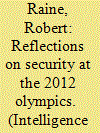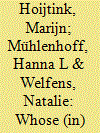| Srl | Item |
| 1 |
ID:
141626


|
|
|
|
|
| Summary/Abstract |
Securing the 2012 Olympic Games was the biggest security operation in the UK for nearly 70 years. It demanded levels of resources unparalleled in peacetime and involved the British Government much more deeply in strategy, planning and assurance for a domestic security operation than is usual. The UK's counter-terrorist strategy, CONTEST, provided the basic framework for the approach to Olympic security but steps were needed to mitigate all risks to the Games security. It was an exceptional level of inter-agency coordination and cooperation, rather than any new techniques, that lay behind the success of the security posture.
|
|
|
|
|
|
|
|
|
|
|
|
|
|
|
|
| 2 |
ID:
193141


|
|
|
|
|
| Summary/Abstract |
Building on feminist and postcolonial theoretical approaches across International Relations (IR) and security studies, this Special Issue advances an emerging research agenda within EU studies by shedding light on the gendered and racialised logics of EU security and their links to colonial histories and practices. Together, the contributions to this Special Issue demonstrate how EU security is intrinsically connected to and constituted by histories of colonialism, racism and patriarchy. At the same time, they also highlight how the colonial, racialised and gendered dynamics that underpin EU security and that are mobilised by the EU, its institutions and member states are always complex and shifting. Importantly, they do so by decentring our analysis of EU security moving our focus often away from the EU and towards different, somewhat unexpected sites and geographical locations of EU security. The current war in Ukraine underwrites the need for more historical, contextual and decentred work on EU security, while also highlighting the necessity to reflect on dominant practices of knowledge production and the experiences of people living in and with war through a feminist and postcolonial lens.
|
|
|
|
|
|
|
|
|
|
|
|
|
|
|
|